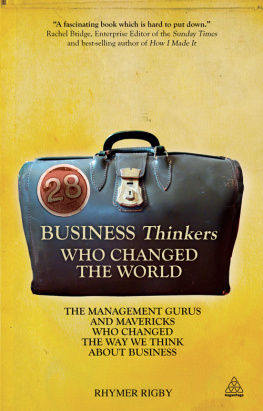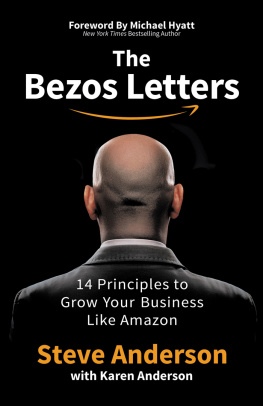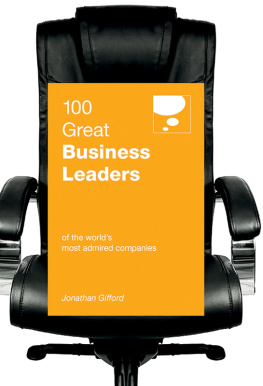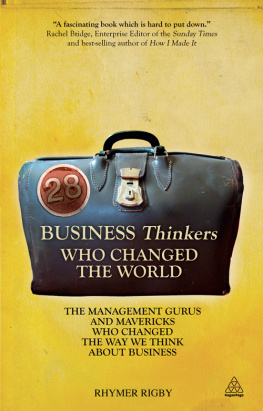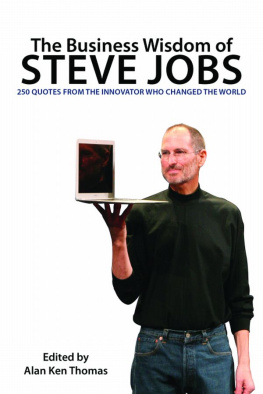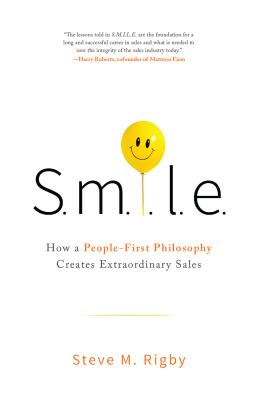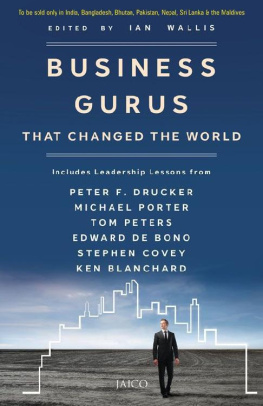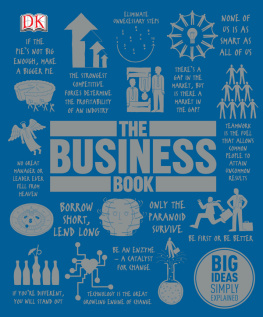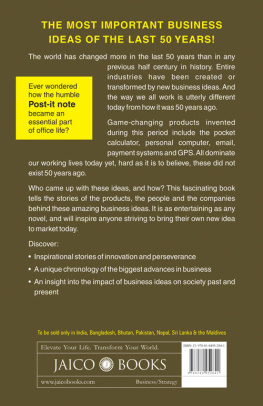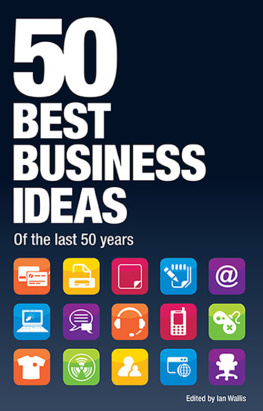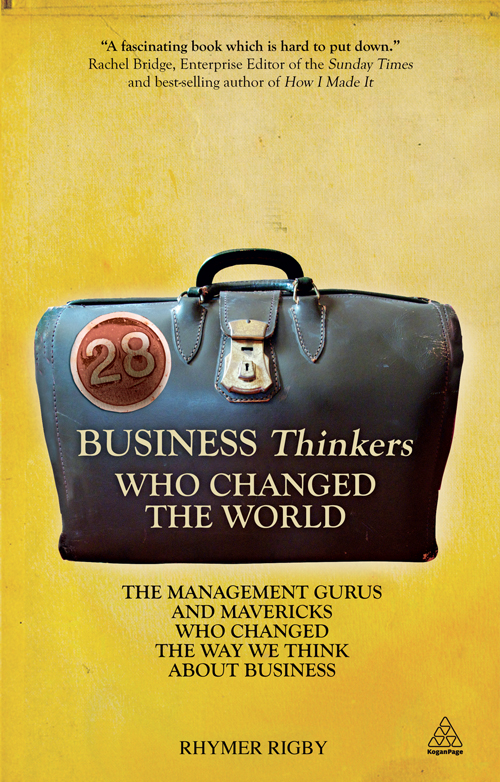Note on the Ebook Edition For an optimal reading experience, please view large
tables and figures in landscape mode. |
This ebook published in 2011 by
Kogan Page Limited
120 Pentonville Road
London N1 9JN
UK
www.koganpage.com
Rhymer Rigby, 2011
E-ISBN 9780749462406
Contents
O ne description of Rupert Murdoch isnt a bad first answer its the ability to consistently see round the corner. But actually the more you look the more you realize that defining what makes a real game changer is about as easy as nailing jelly to a wall. In many cases, you can fairly accurately distil what these people did into a sentence or less. Ingvar Kamprad: brought style to the masses. Warren Buffett: invested in what he understood and believed in. Anita Roddick: business for social change. Howard Schultz: coffee as a lifestyle statement. And so on. But it doesnt really help that much.
Perhaps then they did something startlingly original or something that was blindingly obvious but only in hindsight. Sometimes this is the case. For instance, Mary Kay Ashs great USP was that her business offered women the chances denied to them elsewhere. Sometimes people find a new way of doing what already exists. Google certainly wasnt the first search engine, but it was much, much better than those that came before it. But sometimes people are not really original at all. Ray Kroc did not come up with the original McDonalds concept, nor was his the first restaurant chain. And, as the regular comparisons to Hearst suggest, Rupert Murdoch is hardly the first tycoon to see the possibilities of media ownership and power.
What you realize eventually is that although you can pull together a list of attributes that are likely to make a businessperson go from everyday success to the kind of success that changes a sector, and sometimes even the world, there is no magic list of ingredients. In an entertainingly scathing book review published in 1987, PJ ORourke, wrote: They are Americas young management meatballs. And every man jack of them has a copy of Iacocca: A Biography under his arm The secret is in there. The meatball knows it. If he can just read carefully enough, hell crack the code. ORourke made no secret of his contempt for Iacocca, describing him a few lines later as a conceited, big-mouth glad-handing huckster. But he made a more serious point too and one thats so obvious as to be often ignored. Most of the time, the secret of someones success is that there is no secret. Or rather the secret is so obvious that its not really a secret at all.
Of course, any list like this will to some extent be arbitrary. Its like a top 100 list of films or songs or books. Outside a kind of universal core, you can always make an argument that X should have been left off and Y should have been put on and there will be people who are marginal cases. Here the criterion has simply been that, in some way or another, these people are game changers who had significant and lasting effect on the world of business and sometimes even the world .
This gives a rather broad remit and has even led to the inclusion of one man who was more an academic than anything else, Tim Berners-Lee. That said, as he was the man behind the world wide web, its not difficult to argue that he has changed the business landscape and for virtually everyone in the world. Of course, theres a limit to this kind of reasoning. Make the criteria too wide and you have to start including politicians, artists and so on. But Berners-Lee stays because he directly changed the business world. This kind of reasoning is true, to a lesser extent, of people like Anita Roddick. There are individuals who built up far larger business empires who have not made the cut, but she was the first to fuse business and ethical concerns in a way that appealed to the mainstream and in doing so she had an impact on the world out of all proportion to the size of her business.
The list also has a strong US bias, but that shouldnt surprise anyone. The 20th century the century in which the modern world of business was made has been largely a US century. And most of the business worlds seismic changes, from automation to outsourcing to the dotcom revolution and the financial crisis, have had their genesis in the United States. For nearly 100 years, the greatest concentration of wealth and entrepreneurial talent the world has ever seen has been American. Had this book been published in 1911, it would probably have been dominated by the British; and were it to be published 100 years hence, Indian and Chinese businesspeople could well dominate.
Theres another reason too. It is perhaps the nature of Anglo-Saxon capitalism that leads it to produce so many influential people. Capitalism as practised in the United States has two notable attributes that set it apart. Firstly, its very winner-takes-all. This tends to produce highly visible heroic figures who are venerated above all because they represent, more or less, the capitalist American dream. Places like Europe and Japan do have their hugely influential businesspeople, but they tend to be far lower-key, and there is a far more consensual, collegiate culture (Britain, as ever, sits somewhere in the middle). US capitalism is also extraordinarily disruptive, especially when compared to somewhere like Japan. Old paradigms die quickly, and new ones rise to take their place. Again, this tends to produce heroic figures. These factors are both strengths and weaknesses, but capitalism practised this way does tend to throw up more iconic figureheads than its other variants.
If its hard to pick game changers by their actions, then what about trying to pin down their attributes? For instance, one might expect that, to be a great business thinker, you need to be extraordinarily clever. And theres no doubt that some of them are especially those in clever industries. The Google duo, Bill Gates and Steve Jobs are all undoubtedly extremely bright people. Yet being clever is not a prerequisite. The old clich that a lot of business is not rocket science has more than a grain of truth to it. In many industries there are extremely successful individuals who probably score very highly in terms of emotional intelligence but are not especially outstanding in terms of their brains. As Sir Martin Sorrell says, Business isnt brain surgery, is it? (Rigby, 2004).
So too with background. Its tempting to think that the Rockefellers of our age either rose effortlessly from gilded launch pads or clawed their way up from desperate poverty. Sometimes its true. Oprah Winfrey grew up in very difficult conditions in the Deep South, and there are those on this list who, as the saying goes, were born on third base. But equally there are plenty of middle-class backgrounds out there too. Great business thinkers are drawn from all walks of life. The BBCs Robert Peston (2009) has talked about the entrepreneurs wound, which suggests that an awful childhood, which one is constantly running away from, can be the key to success. Again, there is some truth to this. The swashbucklingly ambitious are not necessarily happy or motivated by what could be described as healthy ambition, and their victories may well be at the expense of others. People who are very successful are often slightly or hugely screwed up, says former Granada Chief Gerry Robinson (Rigby, 2004). Something in that drive is negative. It could be looking for something thats not there. It could be fear of failure. I mean, look at someone like Murdoch what the hells he doing it for? Is another deal going to make any difference? There ought to be some learning in life.

